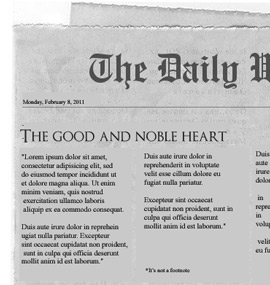Parts of the Old Testament no longer apply to you.
 Tuesday, March 1, 2011 at 11:36AM
Tuesday, March 1, 2011 at 11:36AM  Some ways of describing a God-follower in the Old Testament no longer apply to Christians. Many Christ-followers read the the Old Testament today as if Jesus hasn't come.
Some ways of describing a God-follower in the Old Testament no longer apply to Christians. Many Christ-followers read the the Old Testament today as if Jesus hasn't come.
We can't simply apply certain passages to ourselves without thinking. These passages were written to God's people prior to the Cross and the radical change of heart that comes with Christ's indwelling.
Some ways of describing a God-follower in the Old Covenant are no longer true of you - now that Christ has rescued you.
1. For example: Jeremiah 17:9:
The heart is deceitful above all things and beyond cure. Who can understand it?
Salvation is a rescue of the heart [ -our core self, or nature and tendencies of a person]. Jesus cures the problem of a deceitful and wandering heart by giving us a new, pure, and blameless heart - his own heart/spirit/will embedded in our bodies. [See Ezekiel 36:26; I Cor. 6:11; Heb. 10:10.] This new heart, given to us at conversion, was the missing link in our Story. We needed it in order to reconnect with him:
I will give them a heart to know me, that I am the LORD. They will be my people, and I will be their God, for they will return to me with all their heart.
2. Praise songs that sing, "Create in me a clean heart..." are no longer necessary. David's cry [which is everyone's cry] for a good and noble heart has been answered. So what would David sing now?
3. The Ten Commandments are no longer a necessary yardstick for the Christian. This may be surprising for some. Why? Because the law has been "written on our hearts." By living from the Spirit, our new hearts naturally want to do what the law commanded. External constraints are needed no longer because the internal power and desire to live out the spirit of the law are now active in our deepest selves [our new hearts]. A person who is living from their new heart no longer wants to murder, covet, or make an idol of anything.
As Martin Luther declared: the "Spirit doth make us new hearts, doth exhilarate us, doth excite and enflame our heart, that it may do those things willingly which the law of love commandeth.” You now want God's will, despite your flesh's attempts to deny that.
It's like a parent removing the training wheels from a child's bike: the child no longer needs them because the ability to ride the bike is now within her.
































